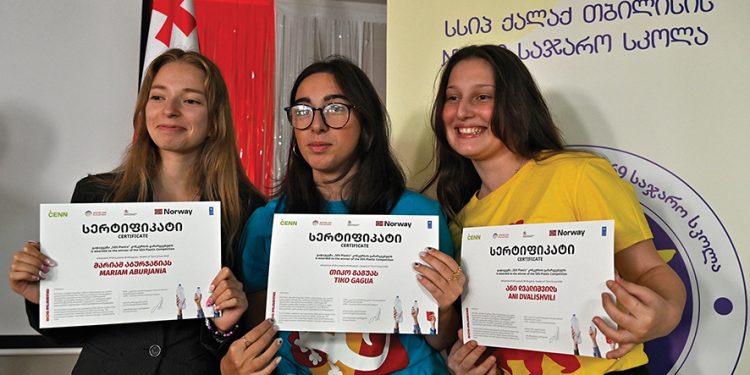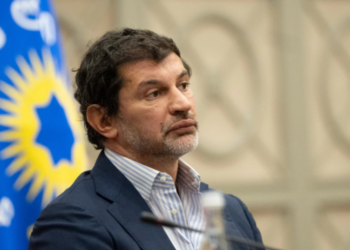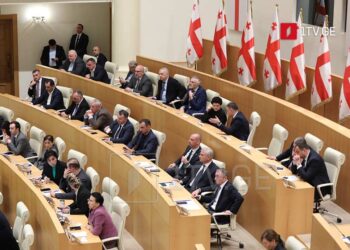In a significant milestone for environmental education in Georgia, the ‘SOS Plastic’ competition concluded with an inspiring awards ceremony held on September 24-25. This initiative, a collaboration between CENN, the United Nations Development Program (UNDP), and Norway, successfully engaged approximately 300 students from 20 schools across the country in innovative activities aimed at reducing plastic waste. The competition was launched within the the End Plastic Pollution in Georgia project.
Empowering Young Environmental Advocates
The ‘SOS Plastic’ project was designed not only to raise awareness, but also to empower students to take tangible action against plastic pollution. Over the span of three months, students devised creative strategies to analyze and reduce their schools’ plastic consumption. Activities included conducting audits to assess their plastic footprint, establishing separation boxes, and setting up water dispensers to minimize the use of single-use plastic bottles.
UNDP’sTamar Siradze emphasized the importance of the initiative, stating, “What we saw in this project was a remarkable opportunity for students and teachers to explore their own impact and develop practical solutions. The engagement and creativity displayed were truly inspiring.” This statement encapsulates the essence of the project: fostering a sense of responsibility among students regarding their environmental impact.
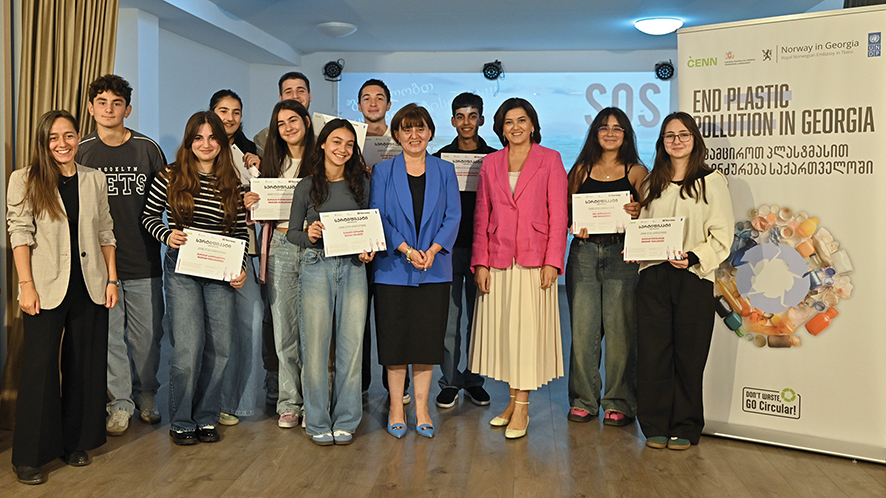
Schools Making a Difference in Sustainability
The awarding ceremony celebrated three standout schools: Tbilisi Public School #169, School Genius of Tbilisi, and Vazha-Pshavela Public School #9 from Gori. Each winning school received a voucher worth 2,300 GEL for an electronics store, along with UN certificates for both students and teachers.
Nato Gaboshvili, Director of Tbilisi Public School #169, highlighted the transformative nature of the project: “The Eco Club has been incredibly active since 2016, and through this competition, we saw a heightened awareness about plastic waste not just among our club members but throughout the entire school community.” Her pride in the students’ achievements is palpable, reflecting a broader trend of growing environmental consciousness in Georgian schools.
Keti Jikia, Head of the Eco Club, shared how the competition altered daily habits: “Our students have replaced single-use plastic cups with reusable ones, showcasing a real change in behavior.” She noted that these changes went beyond just practical measures; they represented a shift in mindset that could have lasting effects. Jikia emphasized the role of educators in facilitating this change: “I thank the organizers. I thank our directorate, and of course, the students who were direct participants in the project. That’s awesome.”
Lela Bedoshvili, Head of the Eco Club and math teacher at Gori #9 Public School, shared:
“We actively participate in various environmental initiatives, and our eco-club has achieved notable success. Last year, we won the energy efficiency competition, which was an exciting opportunity for the school. Within the SOS Plastic campaign, we measured the impact before and after the campaign, and the results showed a significant reduction in plastic consumption within the school. Our activities engaged students of all ages, even involving younger classes in hands-on projects to teach them about the 3R principles (Reduce, Reuse, Recycle) and waste management. Additionally, we partnered with a recycling company to collect and recycle large quantities of plastic, a practice the school plans to continue.”
Innovative Initiatives Across Schools
One particularly noteworthy achievement came from 169 School, where students developed a mobile application aimed at tracking individual plastic footprint. Mariam Aburjania, a member of the Eco Club at Veni School, explained, “We conducted many trainings and created an application that helps us monitor our plastic usage and encourages our peers to recycle.” This innovation not only showcases the technological skills of the students but also reflects their commitment to fostering a more sustainable school environment. The app is currently in the implementation phase, and the students are excited about its potential impact.
The enthusiasm at School Genius was equally noteworthy. Vera Kublashvili, the school director, emphasized the importance of this initiative: “We are creating a good future for Georgia. Children are aware, and this is not a one-time campaign.” She acknowledged the desire among students to make a difference, saying, “You see the desire of the students to do something good and right, and you support them.”
Students at Genius, like Ana Khvedelidze, spoke about their learning experiences. “I learned many new things from these activities that will be useful in my life,” she noted. Ana took her newfound knowledge home, explaining the reduction of plastic consumption to family members and classmates. Her engagement illustrates how the project has fostered a culture of awareness beyond school walls.
Ketevan Feikrishvili, the head of the Eco Club at Genius, shared insights into the club’s journey: “Environmental campaigns are important. As we started working enthusiastically, we made an action plan to reduce plastic waste.” She emphasized that this initiative served not only to engage students but also to raise the voice of the non-school community, highlighting the need for collective action against plastic pollution.
Students at Gori #9 Public School described their activities “We conducted a survey among our pupils about their behaviour trends, which gave us interesting insight into people’s attitudes and behaviour, based on which we then designed specific activities to target pupils’ behaviour.” noted Natali Geladze.
Key Takeaways and Future Directions
Nana Takvarelia, the project head, articulated the broader goals of the End Plastic Pollution project. “The project has been implemented since December of the previous year and includes four main directions,” she explained. “First, we provided tailored training for stakeholders involved in the plastic production and consumption value chain. Our aim is to reduce waste generation through education and awareness.”
Takvarelia underscored the critical importance of mentorship in the campaign: “Each school had a mentor assigned to help them in the direction of waste management and to guide them in implementing their action plans.” This support ensured that schools could effectively assess their unique challenges and develop tailored solutions.
She further explained, “Through the competition, we evaluated activities based on sustainability, real results, and the effectiveness of information campaigns. In the future, we plan to conduct training on waste management and plastic waste in twenty additional schools,” Takvarelia added, indicating the initiative’s potential for growth and expansion.
Moreover, she highlighted the project’s relevance in the broader context of environmental issues facing Georgia: “The generation of plastic waste is very acute. Considering that in our country, for example, we do not have sanitary landfills, and in the last 10 years, the import and production of plastic in Georgia has increased by 71 percent.” This alarming statistic underscores the urgency of initiatives like “SOS Plastic,” aimed at fostering long-term change.
In addition to school initiatives, the project features a campaign aimed at businesses. “We have selected 10 businesses that had the goal or wanted to reduce single-use plastic consumption and switch to green procurement,” Takvarelia shares. These businesses receive training on how to minimize plastic use and adopt green procurement practices. “We are trying to raise awareness specifically in the direction of the circular economy,” she adds.
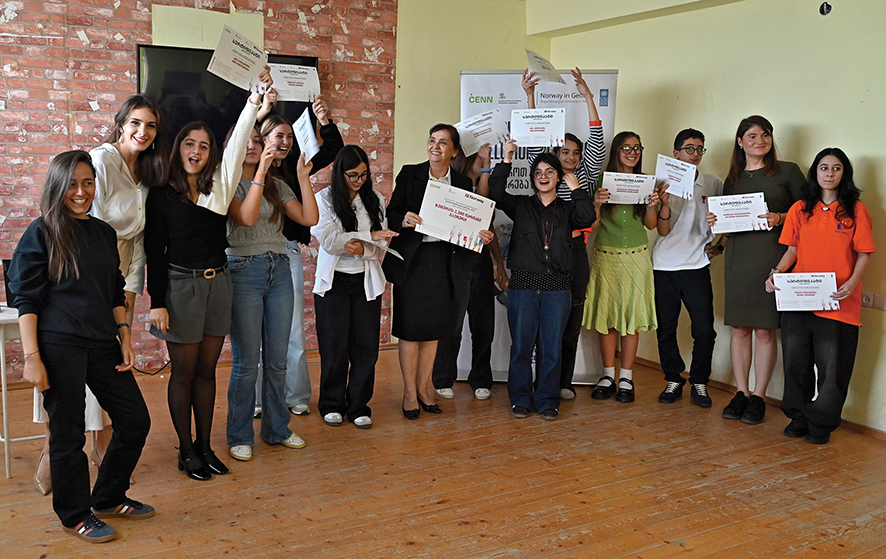
A Broader Impact
The End Plastic Pollution project is part of the larger ‘Leadership, Equality, Advocacy, and Democracy’ (LEAD) program, which focuses on empowering communities and addressing environmental challenges in Georgia. The collaborative effort highlighted the critical importance of engaging educational institutions in sustainability practices.
The project has garnered attention not just for its immediate impact, but also for its potential to influence long-term environmental policy and practices in Georgia. With a 71% increase in the import and production of disposable plastic in the last decade, the urgency of addressing plastic pollution has never been greater.
Nana Takvarelia explained the seriousness of this issue: “In Georgia, the plastic waste situation is becoming more acute. Recent studies have even found microplastics in human blood and breast milk.” The gravity of these findings underscores the need for continued action and advocacy.
The competition also highlighted the importance of engaging families and communities in sustainability efforts. As Ana Khvedelidze mentioned, “I explained the reduction of plastic consumption to family members and classmates.” This type of outreach is essential in creating a ripple effect of awareness and responsibility, extending the impact of the project beyond the classroom.
Inspiring Change Beyond the Classroom
The outcomes of the ‘SOS Plastic’ initiative reflect a growing commitment to sustainability within schools, but they also extend to the community at large. Vera Kublashvili noted, “As educators, we play a vital role in guiding our students, and the enthusiasm they have shown is a testament to the success of this program.”
The competition has not only transformed student behaviors but also instilled a sense of collective responsibility among school communities. Ketevan Feikrishvili added, “It was gratifying to see students recognize the significance of their actions and actively seek to educate others.”
Through thematic exhibitions and digital campaigns, students worked tirelessly to raise awareness about plastic pollution within their communities. Their efforts included creating informative posters, organizing cleanup days, and even engaging local businesses to support their initiatives. This approach illustrates how education can serve as a powerful catalyst for community change.
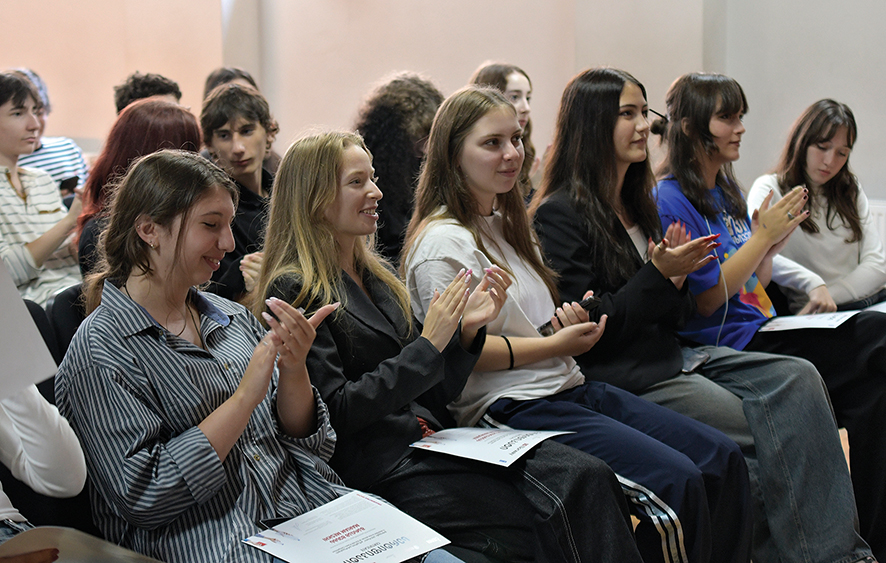
Looking Ahead
As the ‘SOS Plastic’ competition concludes, the momentum continues. With plans for future training sessions and continued engagement with schools and communities, the lessons learned and the relationships built through this initiative promise to extend far beyond the classroom.
The impact of these efforts is already evident, with students and educators committed to fostering an environmentally conscious culture. Lela Bedoshvili encapsulated this vision perfectly: “These students are the future environmental defenders of Georgia.” The journey towards a sustainable future is well underway, and with continued efforts like those seen in the ‘SOS Plastic’ initiative, the path becomes clearer.
As these young environmental advocates develop their skills and awareness, they not only contribute to their immediate communities but also inspire others to take action. The knowledge they have gained and the changes they have implemented will resonate for years to come, making a meaningful contribution to the fight against plastic pollution in Georgia and beyond.
The ‘SOS Plastic’ initiative shows how important young people are in taking care of the environment. The hard work of students, teachers, and community members highlights what we can accomplish when we unite for a shared goal. Moving forward, our dedication to reducing plastic waste and promoting sustainability will help create a healthier future for Georgia and our planet for many years to come.
The project End Plastic Pollution in Georgia is being implemented by CENN with support from United Nations Development Programme (UNDP) and Norway. under the initiative: “LEAD: Leadership, Equality, Advocacy, Democracy” in collaboration with Ministry of Environmental Protection and Agriculture.
By Kesaria Katcharava

